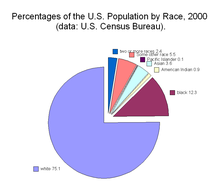
Back Afro-Amerikaners Afrikaans አፍሪካ አሜሪካውያን Amharic أمريكيون أفارقة Arabic امريكيين افارقه ARZ Afroamericanu d'Estaos Xuníos AST Afroamerikalılar Azerbaijani آفروآمریکالیلار AZB Afroamerikana BAR Афраамерыканцы Byelorussian Афраамэрыканцы BE-X-OLD
| Underklasse til | Amerikanere, sort, afro-amerikansk | |
|---|---|---|
| Del af | Amerikanere | |
| Modersmål | amerikansk-engelsk, African American Vernacular English | |
| Religion | Protestantisme, katolicisme, islam | |
| Land | USA | |
| Indbyggertal | 42.020.743 | |
| Oprindelsesland | Afrika | |
| Diaspora | African diaspora | |

Malcolm X, Rosa Parks og Sojourner Truth.

Afroamerikanere eller afrikansk-amerikanere (engelsk: African Americans)[1] er en etnisk gruppe af amerikanere, hvis forfædre ankom til USA fra Afrika enten som slaver i perioden mellem det 17. og 19. århundrede, eller senere som indvandrere.[2][3] Udtrykkene bruges af nogle til udelukkende at inkludere de personer der nedstammer fra slaver fra Afrika.[4][5] I USA bruges udtrykket "African-American" snarere end "Afro-American", som af nogle opfattes som nedsættende.[6]
Der var 42 mio. amerikanere af afrikansk oprindelse i USA ved den amerikanske folketælling i 2010 (inklusive 3,1 mio. af blandet etnicitet), hvilket svarede til 13,6 % af befolkningen.[7] Amerikanere af afrikansk oprindelse udgør den tredjestørste etniske gruppe i USA (efter hvide amerikanere og Hispanic- og latinoamerikanere) ifølge denne folketælling.[8]
- ^ West, Cornel (1985). "The Paradox of Afro-American Rebellion". I Sayres, Sohnya; Stephanson, Anders; Aronowitz, Stanley; Jameson, Fredric (red.). The 60s Without Apology. University of Minnesota Press. s. 44-58. ISBN 0-8166-1337-0.
- ^ "The Black Population: 2010" (PDF), Census.gov, September 2011. "... "Black or African Americans" refers to a person having origins in any of the Black racial groups of Africa. The Black racial category includes people who marked the "Black, African Am., or Negro" checkbox. It also includes respondents who reported entries such as African American; Sub-Saharan African entries, such as Kenyan and Nigerian; and Afro-Caribbean entries, such as Haitian and Jamaican."
- ^ African Americans Law & Legal Definition: "African Americans are citizens or residents of the United States who have origins in any of the black populations of Africa. In the United States, the terms are generally used for Americans with at least partial Sub-Saharan African ancestry."
- ^ Carol Lynn Martin, Richard Fabes (2008). Discovering Child Development. Cengage Learning. s. 19. ISBN 1111808112. Hentet 25. oktober 2014.
...most (but not all) Americans of African descent are grouped racially as Black; however, the term African American refers to an ethnic group, most often to people whose ancestors experienced slavery in the United States (Soberon, 1996). Thus, not all Blacks in the United States are African-American (for example, some are from Haiti and others are from the Caribbean).
- ^ Don C. Locke, Deryl F. Bailey (2013). Increasing Multicultural Understanding. SAGE Publications. s. 106. ISBN 1483314219. Hentet 23. oktober 2014.
African American refers to descendants of enslaved Black people who are from the United States. The reason we use an entire continent (Africa) instead of a country (e.g., Irish American) is because slave masters purposefully obliterated tribal ancestry, language, and family units in order to destroy the spirit of the people they enslaved, thereby making it impossible for their descendants to trace their history prior to being born into slavery.
- ^ Opslagsordet Afro-American i Urban Dictionary. Urbandictionary.com, dateret 27. november 2006, besøgt 5. juli 2020.
- ^ "The Black Population: 2010" (PDF). Census.gov. september 2011. Hentet 5. juli 2020.
- ^ American FactFinder, United States Census Bureau. "United States – QT-P4. Race, Combinations of Two Races, and Not Hispanic or Latino: 2000". Factfinder.census.gov. Arkiveret fra originalen 12. februar 2020. Hentet 20. januar 2011.
